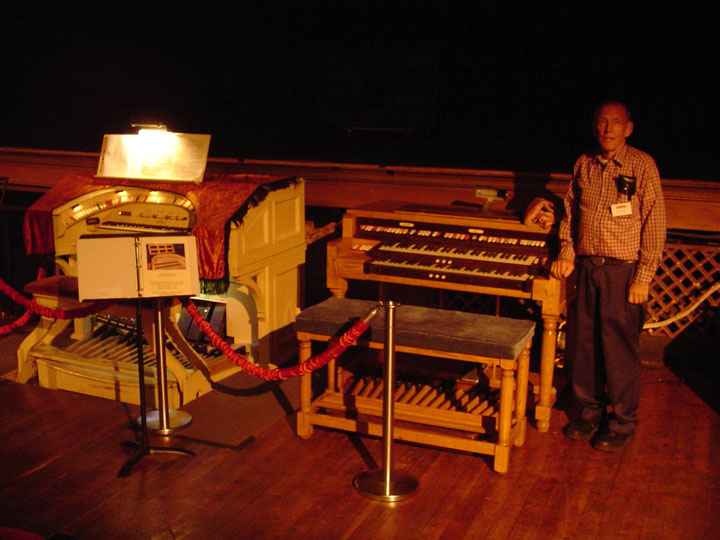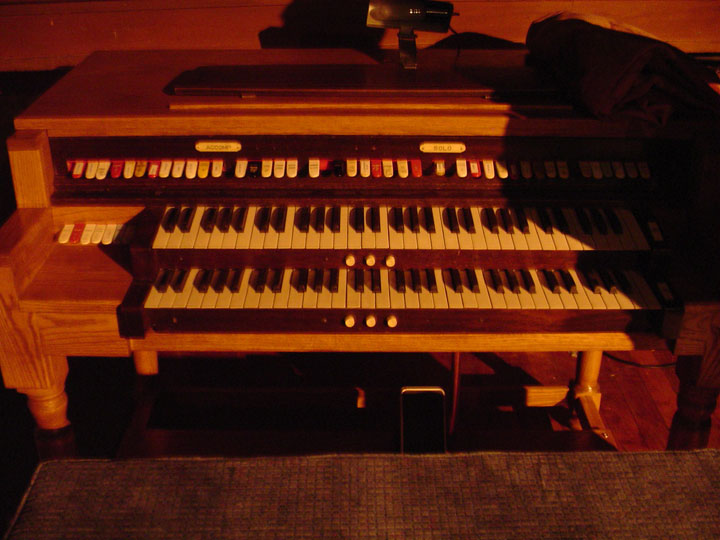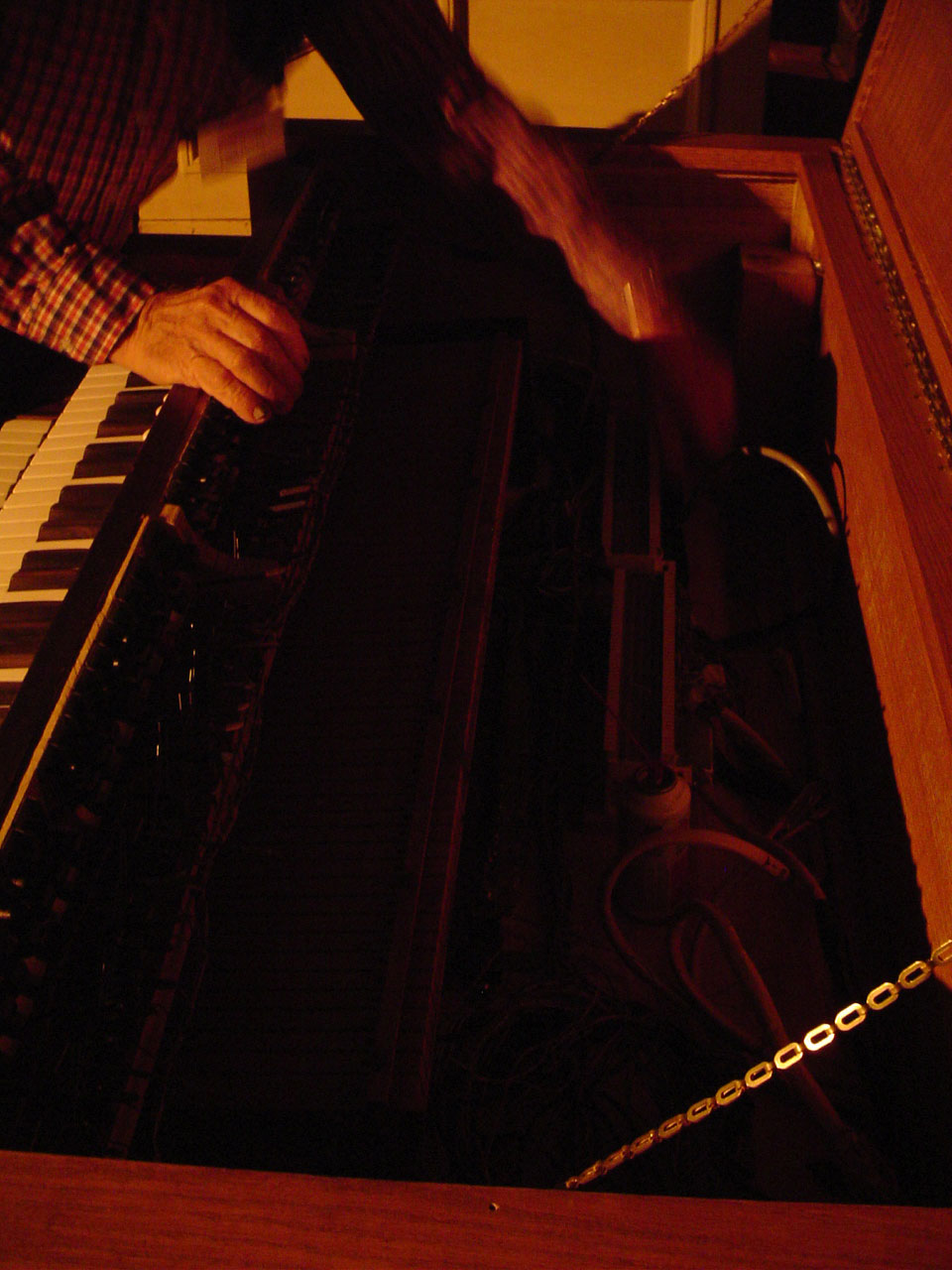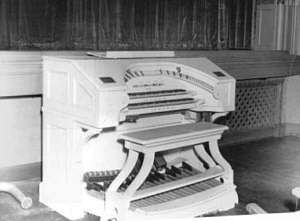If you look at this picture and just see a guy standing next to an organ – I must inform you it is MUCH more than that. I have exciting news for any fans of the Lincoln Theater in Mount Vernon, WA – fans of Wurlitzer organs and fans of the Rocky Horror Show.
What are are looking at on the left is one of the oldest original functioning Wurlitzer organs in the United States. It is the house organ of the Historic Lincoln Theater in Mount Vernon, WA. The organ to the right of that is a custom built remote control organ that can control the keys and stops of the main organ from up to 70 feet away. On the right is Fred Beeks, one of the men who custom built this new functional work of art.
With the sepia tones of the photograph and old world craftsmanship you might think this picture was taken in the 1920’s – but it was taken September 18, 2007.
Several months ago I went down to the Lincoln Theater to jam on the Wurlitzer a bit. I met Fred Beeks who gave me a tour of the backstage where all the Wurlitzer pipes, cables and bellows are housed. It was an amazing thing to witness. You just don’t see that kind of complex machinery for organs much any more. If a note goes out, Fred climbs up to the rafter and hand solders the connections back in place for the organ. It’s amazing.
When I was jamming on the organ I had mentioned to Fred how much fun it would be if I could play the Wurlitzer during our upcoming production of the Rocky Horror Show. One big problem – for stage shows at the Lincoln Theater companies usually utilize the extended thrust of the stage – which covers up the Wurlitzer organ. The organ becomes under the stage and cannot be played. For me that would be a done deal, can’t be done. But not for Fred.
Fred Beeks mentioned they could make a master control unit I could use onstage to control the Wurlitzer. At the time he said I would be limited to preset stops on the Wurlitzer – just one setting. So when I walked in to see the new controller I was naturally expecting a small keyboard, perhaps on aluminum legs. I was totally blown away by what I saw.
Gene Peden, longtime organist at the Lincoln Theater, custom built a cabinet for the new controller organ. Complete with rounded legs. See the picture below for a close-up. It’s absolutely beautiful.
Then Fred Beeks did all the custom wiring into the cabinet that Gene Peden built. The master organ now controls most all of the stops on the Wurlitzer. Now I may have the fine details a little off, Gene and Fred worked together on the project as a whole.
Here’s what you may not know about the Wurlitzer organ at the Lincoln Theater – It’s not just an organ, it also controls all sorts of live special effects on the wings and throughout the auditorium. (Details on stops and fx listed further down on this post). There are chimes down each side of the auditorium, a player piano on the stage left wing, mallet instruments on the stage right wing (all three fully visible to the audience). In the top stage left box there are percussion fx with drums and cymbals. And now all of those can be controlled remotely with this new unit – and integrated into any live stage show at the Lincoln.
So I said to Fred, “Do you realize that most of the people attending our Rocky Horror Show have never even heard of a theater organ, don’t even know they exist?” – He smiled the smile of an all-knowing sage and said softly “We know. That’s why we did it.”
A big thank you to the Lincoln Theater for making this happen. Fred Beeks, Gene Peden and facilities manager Roger Gietzen – they just don’t make ’em like you guys any more. You are the best.
And I should tell you another thing about the Lincoln Theater. Before I moved to Mount Vernon, WA I was visiting my family here and we went to see a local stage production at the Lincoln. I walked into this place and thought to myself, “What kind of community has the commitment to keep a place like this going?” – It was a theater straight out of the 1920’s – beautifully preserved. I knew there must be some big hearts in Mount Vernon, WA and Skagit County. I was right.
It takes a VERY committed community to keep the Lincoln going, and it tells tons about the passion for the arts in Skagit County. It was one of the things that made me want to move here – I hope people in City Hall pay attention to that and keep it going.
Visit the Lincoln Theater website at http://www.lincolntheatre.org
Lincoln Theater Volunteer Organists
Fred Beeks
Ruth Ann Burley
Glen Desjardins
Gene Peden
About the Wurlitzer Organ at the Lincoln Theatre
Wurlitzer magic keeps tradition alive
Of the 98 Wurlitzer organs remining in their original theaters in the U.S., the Lincoln Theatre’s Wurlitzer is one of only two 2-manual, 7-rank D-2 Full Unit Orchestra models. It has a full set of organ pipes, as well as a set of ‘toys,’ the mechanical sound effects for silent movies, as well as marimbas, drums, glockenspiel, xylophone, cathedral chimes, celeste, etc., and an original Wurlitzer piano.
The Lincoln Wulitzer features seven ranks of pipes, a remote piano, and a complete sound effect system for silent films, including beats, castanets, drums, cymbals, glockenspiels, and marimbas, as well as a set of silver chimes mounted on the auditorium’s painted columns.
The Lincoln’s Wurlitzer Organ
Much work has been done by our pool of volunteer organists and technicians to maintain and repair our musical treasure.
The console has been pulled, cleaned, and rewired; several ranks have been gone through, with new leathers and blocks installed; and the “toy box” for sound effects has been rearranged for easier access and repair. All the work has been done by dedicated volunteers, including Gene Peden, Bob Martin, and Keith Thompson.
The volunteer organists who perform before each film showing are Dusan Mrak, Jeff Fox, Gene Reden, Glen DesJardins, and Ken Fenske. Thanks to all of them for keeping the theater organ tradition alive at the Lincoln!




